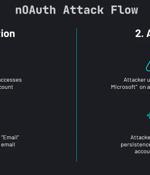Security News

Moving critical data and workloads to the cloud has significantly changed information security teams. Most don't have the resources to be successful in their cloud attack modeling-not to mention the deployment of measurable controls to defend against these evolving attacks.

Empowering Google security and networking solutions with AIIn this Help Net Security interview, Sunil Potti, GM and VP of Cloud Security at Google Cloud, talks about how new security and networking solutions powered by AI help improve security so Google customers can address their most pressing security challenges and remain ahead of an ever changing threat landscape. Infosecurity Europe 2023Infosecurity Europe took place at ExCeL London from June 20-22, 2023 and Help Net Security was on site.

Bug hunters who found security holes in Google - and also responsibly disclosed details of those flaws to the Chocolate Factory - earned more than $12 million in bounty rewards in 2022, marking a record year for the corporation's Vulnerability Reward Programs in terms of payouts and number of vulnerabilities found and fixed. Avrahami found several vulnerabilities and attack paths in Google Kubernetes Engine Autopilot that would allow an attacker to escape their pod, compromise the underlying node, escalate privileges to administrator level, and then deploy backdoors to maintain this access.

Security researchers have uncovered a bug that could allow attackers to deliver malware directly into employees' Microsoft Teams inbox. "Organisations that use Microsoft Teams inherit Microsoft's default configuration which allows users from outside of their organisation to reach out to their staff members," Jumpsec researcher Max Corbridge explained.

Network and IT admins have been dealing with ongoing Microsoft 365 issues this week, reporting that some end users cannot use Microsoft Outlook or other Microsoft 365 apps. The issues started Monday, with numerous admins contacting BleepingComputer to say that some of their users are experiencing disruptive issues in Microsoft Outlook, with the program not opening, freezing after opening, seeing delays in mail delivery, or errors saying there is no valid license associated with the user.

Security researchers have found a simple way to deliver malware to an organization with Microsoft Teams, despite restrictions in the application for files from external sources.With 280 million monthly active users, Microsoft Teams has been adopted by organizations as a communication and collaboration platform part of the Microsoft 365 cloud-based services.

Microsoft says Internet-exposed Linux and Internet of Things devices are being hijacked in brute-force attacks as part of a recently observed cryptojacking campaign. After gaining access to a system, the attackers deploy a trojanized OpenSSH package that helps them backdoor the compromised devices and steal SSH credentials to maintain persistence.

A security shortcoming in Microsoft Azure Active Directory Open Authorization process could have been exploited to achieve full account takeover, researchers said. "nOAuth is an authentication implementation flaw that can affect Microsoft Azure AD multi-tenant OAuth applications," Omer Cohen, chief security officer at Descope, said.

Microsoft is working to address a known issue affecting Outlook for Microsoft 365 customers, causing slow starts and freezes as if Offline Outlook Data Files are being synced right after launch. Users will see errors saying, "Cannot start Microsoft Outlook. Cannot open the Outlook window. The set of folders cannot be opened. The attempt to log on to Microsoft Exchange has failed."

Microsoft has addressed an Azure Active Directory authentication flaw that could allow threat actors to escalate privileges and potentially fully take over the target's account. This misconfiguration could be abused in account and privilege escalation attacks against Azure AD OAuth applications configured to use the email claim from access tokens for authorization.